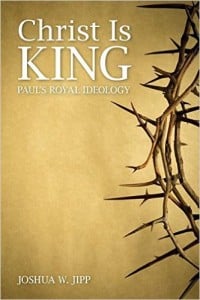 In this post, I engage with Josh’s final chapter in his recent book Christ Is King: Paul’s Royal Ideology: “King and Justice: God’s Righteousness and the Righteous King in Romans.”
In this post, I engage with Josh’s final chapter in his recent book Christ Is King: Paul’s Royal Ideology: “King and Justice: God’s Righteousness and the Righteous King in Romans.”
Interacting with Josh’s carefully argued and evidenced-filled chapters has been rigorously instructive and thoroughly enjoyable. I want to thank Josh again for taking the time to read my posts and provide responses. Both our academic semesters (he at TEDS and I at NPU) have begun again, so it is a good time to bring this discussion to a conclusion.
The fifth chapter’s focus is on an aspect of ancient kingship ideology which conceives of the good king as a righteous one, the embodiment of righteousness, and the person divinely granted to establish a just cosmos for his people. Josh demonstrates that this theme in ancient kingship ideology around the Mediterranean and ANE was widespread. What’s more, and importantly, Josh argues that in Romans Paul’s dik-language is best understood in the context of this kingship ideology. The central contours of the argument are laid out in this extended quotation:
Paul’s justice and judgment discourse in Romans is best illumined when it is considered within the context of ancient discussions of king and justice . . . in Romans, God establishes a just rule over the cosmos through God’s messianic king, who rescues his people and judges his enemies (Rom. 1:1-16-17; 3:21-22). God’s righteousness is revealed and established over the people by means of the resurrecting from the dead his righteous, faithful, and obedient Messiah, whose death had been an apocalyptic revelation of injustice. God’s righteousness is on display, then, in this divine powerful activity to justify the one who is righteous, and this results in the formerly oppressed but now vindicated one having a status of righteousness, a status that is accompanied by God’s actual rescue of the righteous one. For Paul, the Messiah is the only one who is righteous, faithful, and obedient . . . God’s revelation of God’s righteousness in resurrecting the Messiah has salvific consequences for those who belong to the Messiah, given the inextricable relationship between the Messiah and his people. In other words, justification, redemption, and atonement are contingent upon God’s prior act of rightly rescuing his Messiah from death (215-16).
As I see it, the most important elements of his argument are among the following.
The saturation of scriptural texts from the Psalms and Isaiah in the passages where righteousness is the central theme reveals “God’s righteousness” means “God’s resurrection of the righteous Messiah”
The Psalms and the Servant Songs of Isaiah are important source material for Paul’s conceptualization of the “righteousness of God” especially in Rom 1:17. He states, “Paul’s justification-language is laden with allusions to those Septuatinal texts that associate God’s righteousness with God’s righteous but persecuted Messiah whose task is to establish justice for his people” (245). Earlier in the chapter Josh showed that there is a structure of thought in the Psalms where the righteous suffers and calls out to God for deliverance (229). God then responses rightly to save the righteous one, and this is seen as the right thing for God to do (225-31). Josh highlights Psalm 97 and 70 as important Septuagintal texts behind Paul’s phrase. The righteous one in the Psalms was established in the first two Psalms to be the Davidic king (Psa. 1-2). So, Josh, concludes, “When God acts to reveal his divine righteousness, the Davidic figure expects that this will result in his salvation . . . God’s righteousness is revealed in the rescue of God’s righteous Davidic son . . .” (251). The third Isaisanic Servant Song (Isa. 50:7-9) shares a similar structure. Josh sees these texts from Psalms an Isaiah as establishing that God’s righteousness is made manifest in God’s vindication of the only righteous one, Jesus. “The revelation of God’s powerful righteousness has already been enacted in the event whereby the righteous Messiah has been justified and resurrected from the dead . . . God’s justification of humanity is contingent upon the prior act of rightly responding to justify and thereby resurrect God’s unjustly executed Messiah, and this accords closely with what we have seen regarding God’s relationship to God’s king in the Psalter and Isaiah” (252).
The important and inseparable link between Rom 1:1-5 and 1:16-17
Agreeing with scholars such as Stephen Young, Daniel Kirk, Tom Wright and a few others, Josh stresses the inextricable link between Rom 1:1-5 and 1:16-17, while chastising those who have either ignored it or denied it (e.g. Watson). Josh states, “Many of the words and phrases in this so-called thesis statement of Rom. 1:16-17 would be opaque apart from Paul’s contextualization of the statement in Rom. 1:1-5, and yet it must be said that 1:16-17 is frequently interpreted almost entirely apart from nay considerations of 1:1-5 . . . In interpretations of Rom. 1:16-17, scholars too frequently ignore that fact that Paul has already defined God’s gospel” (248). And again I say “Amen!”
The ΔίΚΑΙΟΣ of Habakkuk 2:6 in Rom. 1:17 is the Messiah
Josh states, “Where as I suggest that Paul assumes the association between king/messiah and justice as necessary for the logic of his argumentation, there are some important signals that indicate that Paul sees the Messiah as the singular righteous on who is, thereby, able to justify his people” (253).
He provides four reasons why the “righteous one” refers to the Messiah (255-57).
- Paul has a penchant for describing Christ with articular substantives.
- In Romans Paul generally uses ὁ δίκαιοςin an absolute sense of that which is godly.
- Paul establishes a christological hermeneutic for his reading of Israel’s Scriptures whereby “God’s gospel” (1:1b) is pre-promised “through his prophets in the holy scriptures” (1:2). God’s gospel has as its content God’s resurrection and installation of the Davidic Son in power (1:3-4).
- The variety and prevalence of Jewish and Christian texts that speak of the Messiah as the “Righteous One.”
Josh concludes, “In a letter that centers upon a messianic figure, and opens and concludes with direct references to the messiah’s Davidic heritage (Rom. 1:3-4; 15:7-12), including his role as innocently suffering at the hands of his enemies (Rom. 15:3), it would not be surprising that Paul would intend ὁ δίκαιος to refer to the Messiah in Rom. 1:17b” (257).
The clear support for the subjective reading of ΠΙΣΤΙΣ ΧΡΙΣΤΟΥ
Without giving much comment, it is interesting and important that Josh takes the subjective reading of ΠΙΣΤΙΣ ΧΡΙΣΤΟΥ: “It is Christ’s faithfulness (ἐκ πίστεως) that justifies those who have faith (εἰς πίστιν) in 1:17b” (262). While the argument does not depend on it, a subjective reading coheres with and confirms his overall point that the unrighteous are made righteous through the faith of the Messiah.
All four of these points, I am sympathetic with and find Josh’s arguments largely convincing.
Perhaps one question, and I apologize for its specificity – this level of knit-picking is certainly because of how much I agree with Josh. But I do think it is an important assumption of the overall argument and clarification is needed. In discussing the point that God’s righteousness is his justification of the Messiah, the “Righteous One”, Josh offers this summation – only the first two of the three points is relevant for my question:
(a) God’s righteousness is revealed in his resurrection and granting of eschatological life to the Messiah; (b) the Messiah’s vindication from death is due to the fact that, as a good king, he has established himself as righteous before God . . .” (245, emphasis added)
So my question: In the story of Jesus, when did he “rule” as a “good king,” a rule which forms the basis of his righteousness before God”, which, then, is the basis of God’s act on his behalf?
Do you mean Jesus earthly life and ministry? Is Paul assuming more than the faithful death of Jesus? What do you have in mind here?
In conclusion, this chapter alone demonstrates the thorough-going nature of Paul’s Davidic Christology. What’s more, both in this chapter and throughout the whole book, Josh has shown the significant resource Davidic Messianism can be for unlocking infamous Gordian theological knots in Paul’s thinking. Whatever work I may do in the future on Davidic Christology, Josh’s book will be a starting point for Paul.















